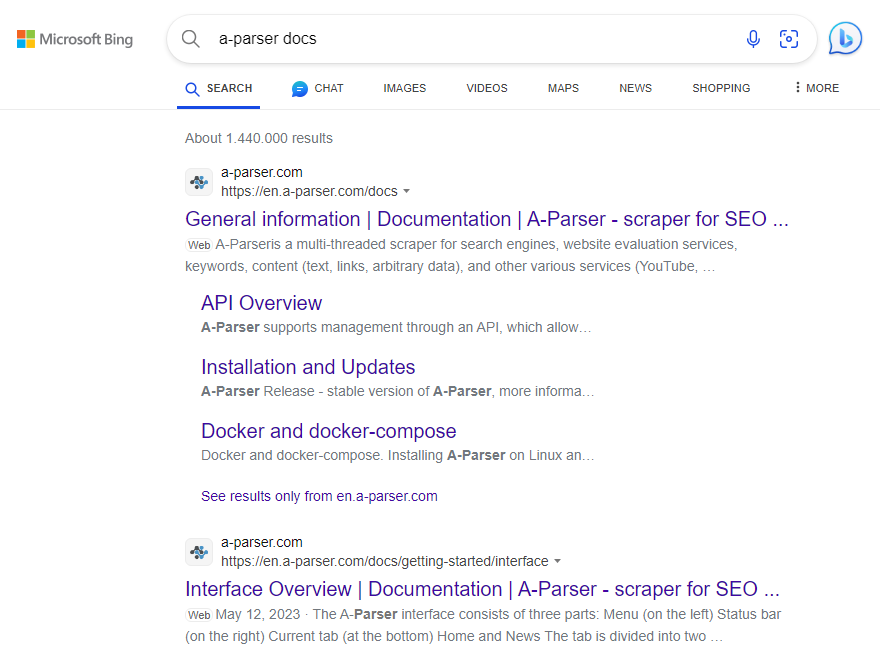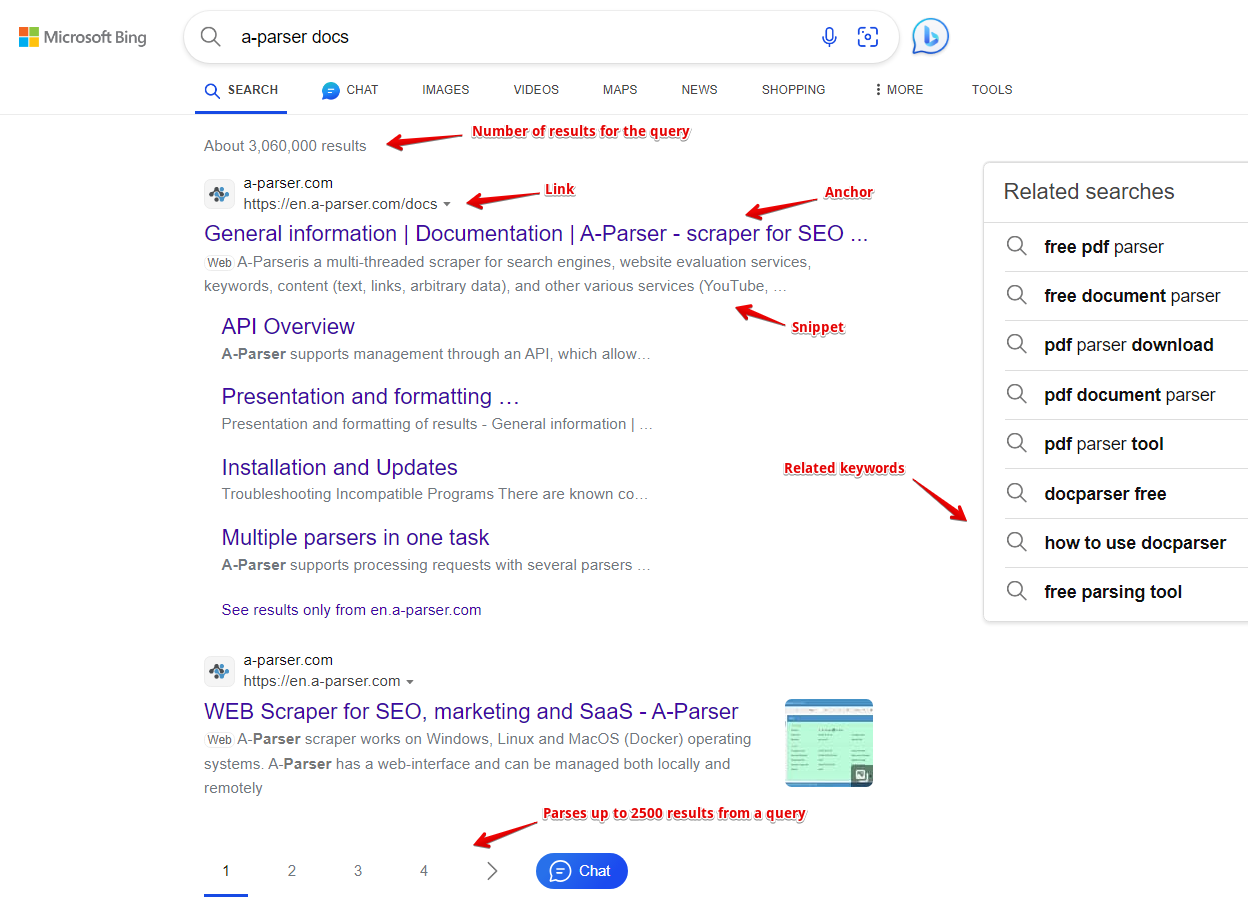SE::Bing - Bing search results scraper

Overview of the scraper
The Bing search results scraper. allows you to get huge link databases ready for further use. You can use queries in the same form as you enter them into the Bing search bar, including search operators (contains, intitle, language, site etc.). More details on the official Advanced search keywords.
A-Parser's functionality allows you to save Bing scraper parsing settings for future use (presets), ), set a parsing schedule, and much more. You can use automatic query multiplication, substitution of subqueries from files, iteration of alphanumeric combinations and lists to get the maximum possible number of results.
Results can be saved in the form and structure you need, thanks to the powerful built-in templater Template Toolkit which allows you to apply additional logic to the results and output data in various formats, including JSON, SQL and CSV.
Use cases for the scraper
🔗 Scraping Bing search results
Scraping Bing with automatic query multiplication (Parse all results)
🔗 Scraping top 10 and tag content
Multilevel scraping. Scraping top 10 and the content of title and description tags for these sites
🔗 JS scraper based on the Bing scraper
Creating JS scrapers. Getting results from the standard scraper
🔗 Scraping all results in Bing
Scraping with intelligent query substitution via the Template Toolkit templater and tools.query.add
🔗 Deduplication in Bing
Scraping unique URLs by key and deduplication by domain, with the ability to specify the maximum number of URLs per domain
🔗 Multiple scrapers in a preset
The preset shows an example of using multiple scrapers
Collected data
- Number of results per query
- Links, anchors, and snippets from search results
- List of related keywords
- Links, visible links, anchors, snippets, and position of ads from advertising results

Capabilities
- Support for all Bing search operators (site:, ip: etc.). More details about search operators on the official Advanced search keywords.
- Scrapes the maximum number of results provided by Bing - up to 200 pages of search results
- Can automatically scrape more than 1000 results per query - substitutes additional characters (the Parse all results option)
- Ability to deep scrape related keywords (Parse related to level)
- Ability to find related keywords
- Ability to scrape links to cached pages
- Ability to scrape mobile search results
- Support for loading data when scrolling in the mobile layout
The following scrapers work based on the Bing scraper:
 SE::Bing::Position - determining the positions of any sites in the search results based on a list of queries
SE::Bing::Position - determining the positions of any sites in the search results based on a list of queries
Use Cases
- Collecting link bases - for A-Poster, XRumer, AllSubmitter, etc.
- Assessing competition for keywords
- Searching for backlinks (mentions) of sites
- Checking site indexing
- Finding vulnerable sites
- Finding sites on the same IP address
- Any other options involving Bing scraping in some form
Queries
Search phrases should be specified as queries, exactly as if they were entered directly into the Bing search form, for example:
test
windows Moscow
site:http://lenta.ru
ip:222.36.12.12
Query substitutions
You can use built-in macros to multiply queries, for example, if we want to get a very large database of forums, we specify several main queries in different languages:
forum
forum
foro
论坛
In the query format, we specify iterating through characters from a to zzzz, this method allows maximum rotation of search results and retrieval of many new unique results:
$query {az:a:zzzz}
This macro will create 475254 additional queries for each source search query, which will total 4 x 475254 = 1901016 search queries, an impressive number, but this is not a problem for A-Parser. At a speed of 2000 queries per minute, this task will be processed in just 16 hours.
Using operators
You can use search operators in the query format; this way, they will be automatically added to each query in your list:
site:$query
Output Results Examples
A-Parser supports flexible results formatting thanks to the built-in templater Template Toolkit, which allows it to output results in any form, as well as in a structured format, such as CSV or JSON
Exporting a list of links
Links + anchors + snippets with position output
Output of links, anchors, and snippets to a CSV table
Saving related keywords
Keyword competition
Checking link indexing
Saving in SQL format
Dumping results to JSON
Results Processing
A-Parser allows you to process results directly during scraping; in this section, we provide the most popular use cases for the Bing scraper
Link deduplication
Link deduplication by domain
Extracting domains
Removing tags from anchors and snippets
Filtering links by inclusion
Possible settings
| Parameter Name | Default Value | Description |
|---|---|---|
| Pages count | 10 | Number of pages to scrape (from 1 to 200) |
| Region | Based on IP | Region selection. List of regions. |
| Interface language | Any | Interface language selection. List of languages. |
| Safe Search | Moderate | Safe search option selection (Strict / Moderate / Off) |
| Device | Desktop | Search device selection (Desktop / Mobile) |
| Show inaccessible results | ☐ | Allows you to enable the display of hidden results |
| Stop pagination by results count | 0 | Stops pagination traversal upon reaching a specified number of results. Works in addition to Pages count; scraping stops depending on which is reached first: the set number of pages or the set number of results. |